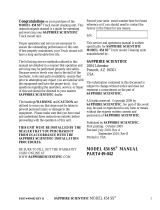6 BRIGGSandSTRATTON.COM
WARNING
Contact with muffler area can result in serious
burns.
Exhaust heat/gases can ignite combustibles,
structures or damage fuel tank causing a fire.
• DO NOT touch hot parts and AVOID hot exhaust gases.
• Allow equipment to cool before touching.
• Keep at least 5 feet (1.5 m) of clearance on all sides of water
transfer pump including overhead.
• Code of Federal Regulation (CFR) Title 36 Parks, Forests, and
Public Property require equipment powered by an internal
combustion engine to have a spark arrester, maintained in
effective working order, complying to USDA Forest service
standard 5100-1C or later revision. In the State of California a
spark arrester is required under section 4442 of the California
Public resources code. Other states may have similar laws.
WARNING
Starter and other rotating parts can entangle
hands, hair, clothing, or accessories.
• NEVER place hands or body parts inside of running pump or
hoses.
• NEVER operate water transfer pump without protective housing
or covers.
• DO NOT wear loose clothing, jewelry or anything that may be
caught in the starter or other rotating parts.
• Tie up long hair and remove jewelry.
NOTICE
Improper treatment of water transfer pump can damage it
and shorten its life.
• If you have questions about intended use, ask dealer or contact
qualified service center.
• Be sure pump chamber is filled with water before starting the
engine. Never run pump without priming.
• Use a non-collapsible hose on the suction side of pump.
• Use water pump only for intended uses.
• Pumping sea water, beverages, acids, chemical solutions, or any
other liquid that promotes corrosion can damage the pump.
• Ensure all connections are air tight.
• DO NOT obstruct the suction or discharge hose in any way.
• NEVER operate pump without strainer basket connected to end
of suction hose.
• DO NOT exceed suction head maximum of 8m (25 ft.) and total
head of 32m (106 ft.). Use shortest suction head possible (see
page 10).
• NEVER allow vehicles to drive over hoses. If a hose must be
positioned across a roadway, use planking on each side of hose
to allow vehicles to pass over without obstructing or collapsing
hose.
• Anchor pump to avoid “walking” or equipment movement,
especially if located near a ditch or edge of open ravine. The
equipment could fall in.
• Keep equipment away from edge of river or lake where it could
cause the bank to collapse.
• DO NOT insert any objects through cooling slots.
• NEVER operate units with broken or missing parts, or without
protective housing or covers.
• DO NOT by-pass any safety device on this machine.
• NEVER move machine by pulling on hoses. Use frame on unit.
• Check fuel system for leaks or signs of deterioration, such as
chafed or spongy hose, loose or missing clamps, or damaged
tank or cap. Correct all defects before operating water transfer
pump.
• This equipment is designed to be used with Briggs & Stratton
Power Products authorized parts ONLY. If equipment is used
with parts that DO NOT comply with minimum specifications,
user assumes all risks and liabilities.
CAUTION
Excessively high operating speeds increase risk of injury
and damage to water pump.
Excessively low speeds impose a heavy load.
• DO NOT tamper with governed speed.
• DO NOT modify water pump in any way.
• DO NOT allow unqualified persons or children to operate or
service water pump.
WARNING
Starter cord kickback (rapid retraction) can result
in bodily injury. Kickback will pull hand and arm
toward engine faster than you can let go.
Broken bones, fractures, bruises, or sprains
could result.
Keep hands and body clear from discharge of
pump.
• When starting engine, pull cord slowly until resistance is felt and
then pull rapidly to avoid kickback.
• Secure discharge hose to avoid whipping.




















